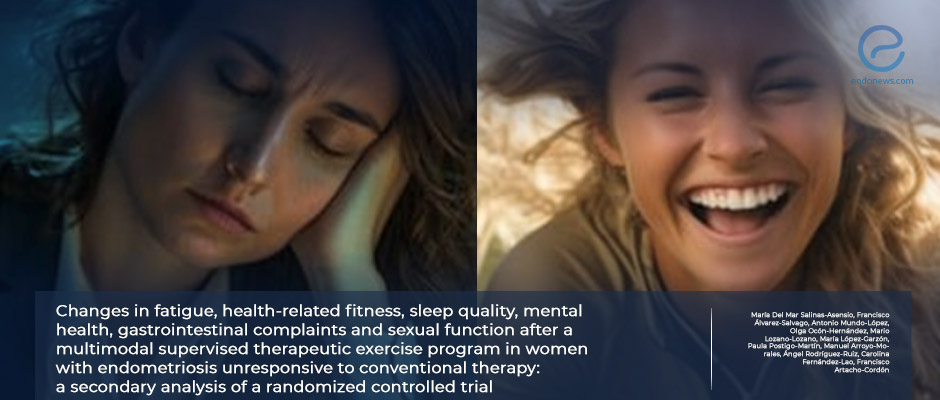Supervised Exercise for Refractory Endometriosis
Sep 12, 2025
A 9-Week Exercise Program Shows Lasting Benefits for Endometriosis Patients Unresponsive to Standard Therapy
Key Points
Highlights:
- Supervised multimodal exercise, named Physio-EndEA program, led to significant and sustained reductions in fatigue, with parallel improvements in mental health and physical fitness in endometriosis patients.
- Benefits persisted 3 months after the intervention, suggesting durable effects beyond the active program.
Importance:
- Endometriosis management often leaves residual symptoms such as fatigue and psychological distress, even after optimal surgery or medical therapy.
- Exercise interventions could represent an effective, non-pharmacological adjunct for improving quality of life in women with refractory endometriosis symptoms.
What’s done here:
- A randomized controlled trial conducted in Spain tested the impact of a 9-week supervised multimodal exercise program (Physio-EndEA) in women with endometriosis unresponsive to conventional treatments.
- The program included resistance, aerobic, flexibility, and relaxation components, delivered twice weekly.
- Outcomes were assessed at baseline, after the intervention, and at 3-month follow-up.
- Primary endpoint was fatigue severity. Secondary endpoints were sleep quality, anxiety, depression, and cardiorespiratory fitness.
Key results:
- In terms of fatigue, sgnificant and clinically relevant reductions appeared compared to the control group, whichwas maintained at 3-month follow-up.
- Concerning mental healt, depression and anxiety scores improved post-intervention and remained improved at follow-up.
- Cardiorespiratory fitness also improved, suggesting systemic benefits beyond symptom relief.
- However, no significant changes were detected in sleep quality scores.
- The program was feasible, well tolerated, and adherence rate was high.
Strength and Limitations:
- This is the first randomized controlled trial to evaluate a structured, multimodal exercise program specifically for refractory endometriosis-related fatigue. A comprehensive assessment that includied both psychological and physiological endpoints, together with follow-up data confirming sustained benefits, are among the main strengths of the study.
- The limitations include a relatively small sample size, which restricts generalizability; the single-center design, which makes external validity across different healthcare systems uncertain; reliance on self-reported questionnaires without objective biomarkers for fatigue or sleep; and the lack of long-term follow-up beyond three months.
From the Editor-in-Chief – EndoNews
"Fatigue in endometriosis is a silent disability—poorly measured, poorly treated, yet profoundly life-altering. This trial from Spain marks a turning point: it demonstrates that exercise is not just lifestyle advice but a therapeutic intervention capable of reducing fatigue, improving mood, and enhancing physical fitness in women who had exhausted standard medical options.
What makes this study important is not only its randomized design but also its sustained signal of benefit at three months post-intervention. That durability suggests a biological effect, not simply a placebo response. Moreover, the inclusion of psychological and physiological endpoints captures the multidimensional nature of fatigue, often overlooked in endometriosis research.
Yet, caution is warranted. The study is small, single-center, and based on self-reported outcomes. It cannot yet dictate clinical practice. Still, it provides proof-of-concept that structured, supervised exercise can be integrated into multidisciplinary care.
The message is clear: while surgery and hormones remain indispensable, empowering patients through supervised rehabilitation programs could reshape supportive care for endometriosis. Future multicenter trials must test scalability, cost-effectiveness, and long-term outcomes. If confirmed, exercise may become a cornerstone in alleviating one of endometriosis’ most neglected burdens—chronic fatigue."
Lay Summary
Fatigue is one of the most disabling yet under-recognized symptoms of endometriosis. Even when standard treatments such as surgery or hormonal therapy are applied, many women continue to struggle with exhaustion, low fitness, and psychological distress. Could structured exercise offer a non-pharmacological way forward?
A team led by Dr. Mónica Rodríguez-Rodríguez from the University of Córdoba, Spain, addressed this question in a randomized controlled trial published in the European Journal of Obstetrics & Gynecology and Reproductive Biology. The researchers designed a 9-week supervised exercise program, known as Physio-EndEA, tailored specifically for women with endometriosis who had not responded sufficiently to conventional therapies.
The program combined aerobic training, resistance exercise, flexibility work, and relaxation techniques, delivered twice weekly under professional supervision. A total of women with refractory endometriosis were randomized to either the Physio-EndEA program or standard care. Fatigue was the primary outcome, while secondary outcomes included sleep quality, anxiety, depression, and cardiorespiratory fitness.
The results were encouraging. Women in the exercise group experienced a significant reduction in fatigue, with benefits that persisted even 3 months after the program ended. Improvements were also seen in mental health represented by lower depression and anxiety scores; and physical fitness, suggesting a systemic effect of exercise on overall health. Interestingly, sleep quality did not improve, highlighting that fatigue and sleep may be governed by different mechanisms in endometriosis.
The study’s strengths lie in its rigorous design and its focus on a symptom that has long been neglected in endometriosis care. However, it was a single-center study with a relatively small sample size, and long-term sustainability beyond three months remains unknown.
Still, this trial provides some of the first high-quality evidence that supervised, multimodal exercise can complement medical and surgical treatments for endometriosis, offering women not only symptom relief but also improved resilience and quality of life.
Research Source: https://pubmed.ncbi.nlm.nih.gov/40440865/
Exercise Rehabilitation Fatigue fitness Mental health Sleep endometriosis

